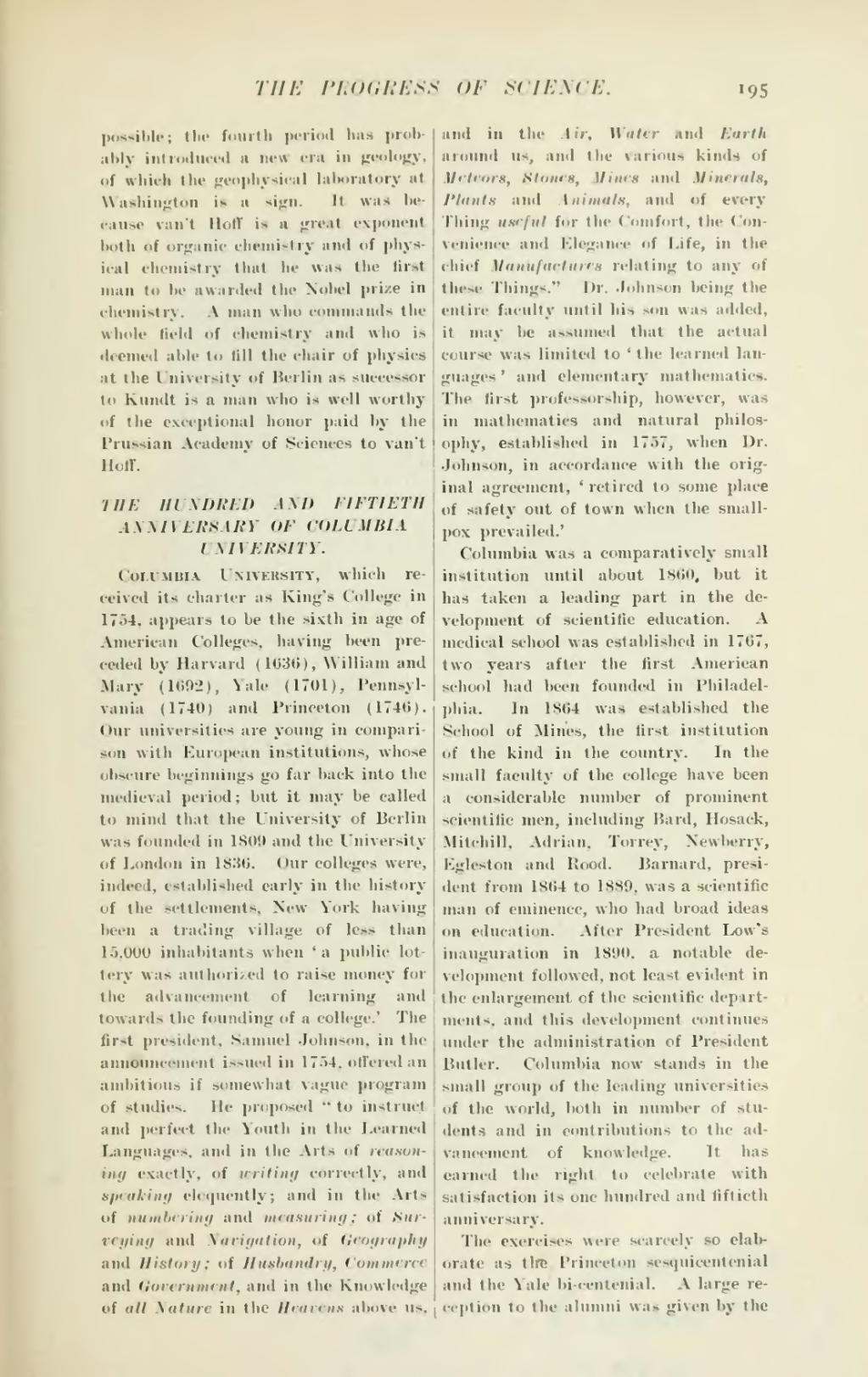possible; the fourth period has probably introduced a new era in geology, of which the geophysical laboratory at Washington is a sign. It was because van't Hoff is a great exponent both of organic chemistry and of physical chemistry that he was the first man to be awarded the Nobel prize in chemistry. A man who commands the whole field of chemistry and who is deemed able to fill the chair of physics at the University of Berlin as successor to Kundt is a man who is well worthy of the exceptional honor paid by the Prussian Academy of Sciences to van't Hoff.
THE HUNDRED AND FIFTIETH ANNIVERSARY OF COLUMBIA UNIVERSITY.
Columbia University, which received its charter as King's College in 1754, appears to be the sixth in age of American Colleges, having been preceded by Harvard (1636), William and Mary (1692), Yale (1701), Pennsylvania (1740) and Princeton (1746). Our universities are young in comparison with European institutions, whose obscure beginnings go far back into the medieval period; but it may be called to mind that the University of Berlin was founded in 1809 and the University of London in 1836. Our colleges were, indeed, established early in the history of the settlements, New York having been a trading village of less than 15,000 inhabitants when 'a public lottery was authorized to raise money for the advancement of learning and towards the founding of a college.' The first president, Samuel Johnson, in the announcement issued in 1754, offered an ambitious if somewhat vague program of studies. He proposed "to instruct and perfect the Youth in the Learned Languages, and in the Arts of reasoning exactly, of writing correctly, and speaking eloquently; and in the Arts of numbering and measuring; of Surveying and Navigation, of Geography and History; of Husbandry, Commerce and Government, and in the Knowledge of all Nature in the Heavens above us, and in the Air, Water and Earth around us, and the various kinds of Meteors, Stones, Mines and Minerals, Plants and Animals, and of every Thing useful for the Comfort, the Convenience and Elegance of Life, in the chief Manufactures relating to any of these Things." Dr. Johnson being the entire faculty until his son was added, it may be assumed that the actual course was limited to 'the learned languages' and elementary mathematics. The first professorship, however, was in mathematics and natural philosophy, established in 1757, when Dr. Johnson, in accordance with the original agreement, 'retired to some place of safety out of town when the smallpox prevailed.'
Columbia was a comparatively small institution until about 1860, but it has taken a leading part in the development of scientific education. A medical school was established in 1767, two years after the first American school had been founded in Philadelphia. In 1864 was established the School of Mines, the first institution of the kind in the country. In the small faculty of the college have been a considerable number of prominent scientific men, including Bard, Hosack, Mitchill, Adrian, Torrey, Newberry, Egleston and Rood. Barnard, president from 1864 to 1889, was a scientific man of eminence, who had broad ideas on education. After President Low's inauguration in 1890, a notable development followed, not least evident in the enlargement of the scientific departments, and this development continues under the administration of President Butler. Columbia now stands in the small group of the leading universities of the world, both in number of students and in contributions to the advancement of knowledge. It has earned the right to celebrate with satisfaction its one hundred and fiftieth anniversary.
The exercises were scarcely so elaborate as the Princeton sesquicentenial and the Yale bi-centenial. A large reception to the alumni was given by the

